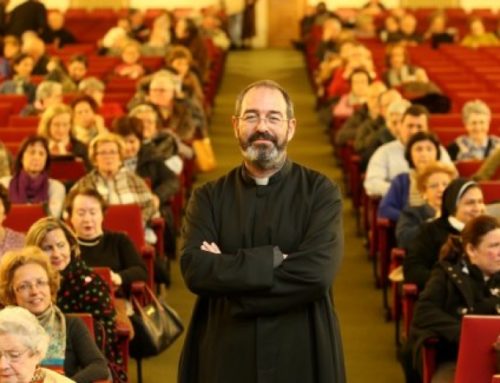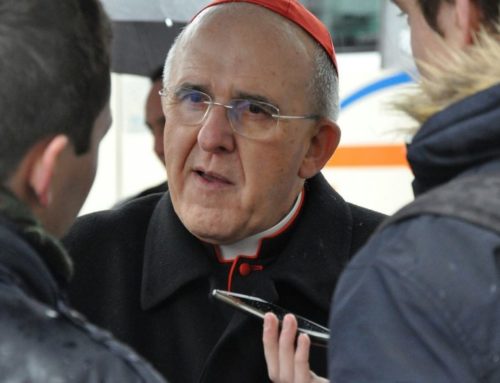The lives of the early Christians are a testament to their remarkable capacity to spread the Faith to others. For this, we interview Professor Domingo Ramos-Lissón, a Professor at the University of Navarra (Spain) and an authority in early church history.
“All Christian faithful are called to accomplish an apostolic task”
The lives of the early Christians are a testament to their remarkable capacity to spread the Faith to others. For this, we interview Professor Domingo Ramos-Lissón, a Professor at the University of Navarra (Spain) and an authority in early church history.
The fast diffusion of christianity in the roman empire during the first century leads one to ask: which factors contributed to such phenomenon?
There are intrinsic and extrinsic factors that influenced the expansion of Christianity. Among the primary causes, it can be said that Christianity benefited from the elements that unified the Roman Empire, since the era of Emperor Augustus.
In the first place, we have to mention the peace and order that this emperor established, supported by thirty legions that protected the boundaries of his vast dominion. Next, we can highlight the ease of communication that united the farthest parts of the territory to the heart of the Empire. An excellent network of roads linked to ports opening to the Mediterranean Sea, which was called Mare nostrum, constituted served as an immense highway that connected large commercial centres during that period.
Another important factor was the popular Greek language, the Greek of the koiné, which is similar to the English language of today. It permitted them to move around and commuinicate in all urban centres of the oikumene. It is true that in some particular cases the Christian preachers of the Gospel had to use “barbaric dialects”, like what St. Irenaeus of Lyon did to evangelize the Gales, but this was less frequent.
Overall, the key element is the innate dynamism of the Christian message. The intrinsic factors spring up from the very message of Christianity.
What was the decisive event that led to all the intrinsic factors that accompanied the expansion of christianity?
Without doubt, I would say that the starting point was the descent of the Holy Spirit during Pentecost. On that day, after the discourse of St. Peter, three thousand of his listeners converted to Christianity. Since conversion brings with it sharing with other persons the gift received, these converts surely communicated the faith to their families and neighbors.
Perhaps, without exaggerating, it could be affirmed that at these early stages of the Christian community, there were as many apostles as there were faithful. The preaching of the Gospel extended to almost every direction – often, through the help of many unknown, ordinary persons. The interior desire to lead other persons to the Christian faith was and still remains an immediate consequence of baptism.
We have a very expressive testimony of this in a treatise that St. Cyprian wrote, around the middle of the third century, addressed to his friend Demetrius. It was a narration of his conversion, his difficulties, and the doubts he had to overcome and of how his life totally changed after receiving baptism. He said with all simplicity: “in a moment, the doubts cleared up marvelously…and I have proven that the inspiration of the Holy Spirit was God’s” (Ad Demetrianum, 4).
Nowadays, we encounter people who consider the apostolic task as something exclusive to priests and the religious. Did something similar happen to the Early Christians?
Absolutely not. In the New Testament, there appear emphasized clear acts of some Apostles like St. Peter, St. Paul and St. John, and also some of the multitude of Christians whose names are unknown to us.
The Didache, a Christian text written at the end of the first century, mentions some ordinary Christians who lived an itinerant life, moving from one city to another, to convey the message of Jesus to all who may want to accept it.
Origen also talks about these Christians. He writes, during the third century: “The Christians take advantage of every opportunity within reach to extend their doctrine to the whole universe. To achieve it, there are those who have dedicated themselves to go from one city to another, from one town to another, to bring others to the service of God” (Contra Celso, III, 9).
Like what we have said previously, all of the faithful were aware of their calling to accomplish an apostolic task, although some dedicated more effort and time to bring it to completion.
What was the role of christian women of the primitive church in the apostolic work?
The apostolic work of women during Christian antiquity had an extraordinary importance. An indicator of the relevance which their work had was the criticisms manifested by some eminent pagans like Pliny, Celsus, and Porphyry. They expressed an abundance of mockery against Christianity, after being informed about the rapid profusion of conversions of women.
Ever since the beginning of Christianity, the women have played an irreplaceable role in the spreading of the Gospel. An example could be Priscilla, who evangelized Apollo, according to the narration of St. Luke (Acts 18:26). Clement of Alexandria describes the role of Christian women who assisted the first Apostles and who were the only ones who can enter in the women’s quarters, acting as intermediaries and bringing to those places the saving doctrine of the Lord (Stromata, III, 6, 53).
In Christian apocryphal literature, we encounter the Acts of Paul and Thecla, a type of historic novel from the second century, whose anonymous author narrates the primary role of Thecla, represented as the evangelist of the Apostle to the women. There are many more examples of the collaboration of women in the spreading of the faith.
If you were to point out some of the characteristics of the early christians that especially attracted the pagans, which would they be?
What captured more the attention of the pagans was the coherent life of the Christians which was just exactly the antithesis of what was considered “politically correct” during that time. Keep in mind that the cultural-religious environment of the Romans was very syncretised and relativistic, especially during the second century, when many pagans were practicing a kind of a pseudo-religion which was a mixture of different religious elements. The contrast of this pseudo-religion with the Christian way of life was very evident that the Christian apologists highlight the coherence of the lives of the Christian faithful.
We can cite what Athenagoras said to challenge the calumny against the Christians. The Christians were accused of murder and anthropophagy. “How can we kill someone if we don’t even want to see someone being killed [allusion to the cruelty of gladiator combats in the Colosseum] so that we may not be stained with such impurity? In contrast, we affirm that those who practice abortion commit homicide and they will have to give an account of such crime before God… We are always and everywhere consistent with ourselves.” (ATHENAGORAS, Leg., 35)
The exemplariness in living the Christian virtues, above all charity, was without doubt, the great force of attraction before the pagans. Tertullian alluded to this in his famous Apologeticum (Apology) where he wrote: “But it is precisely this effectiveness of love present among us that draw the hatred of some. They say ‘Look how they love one another’. Whereas they themselves hate each other.” (TERTULLIAN, Apologeticum, XXXIX, 1-7).
Speaking of the coherence of the christians between their faith and conduct, can you comment on the act of martyrdom as the supreme testimony of the christian? and how difficult was it to live as a christian during those times of the Roman Empire?
It can be said that behind all the persecutions done by the Romans against the Christians there was this political-mental framework united with the god-protectors of the city and the cult to the numen (divinity) of the emperor. In response, the Christians did not yield to the cult of any of these gods which are false by nature because Christians admit the existence of the one God.
But, if we return to the topic about Christian coherence, we would realize that martyrdom is the supreme testimony that a Christian can give. And without doubt that this testimony also has an exemplary value which inspires others to accept the Christian faith.
This is the case of a soldier whose name is Basilides, who accompanied Potamiana, a Christian, in her martyrdom. He showed her great compassion and kindness before the insolence of the mob. Grateful to the soldier, Potamiana told him that she will ask the Lord for his conversion, which actually happened some days later. After declaring that he was now a Christian, he was denounced and condemned to death. (EUSEBIUS of CAESAREA, Historia eclesiástica, VI, 5, 3-6)







Leave A Comment
You must be logged in to post a comment.